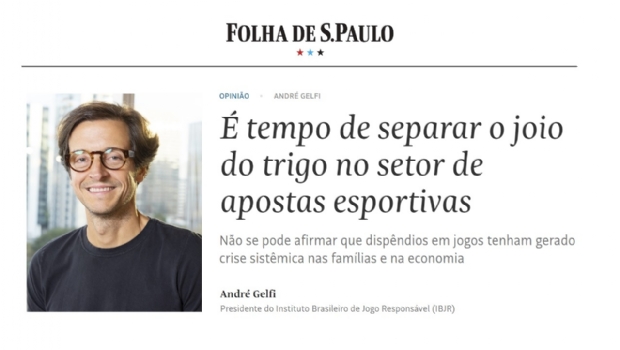
André Gelfi, president of the Brazilian Institute for Responsible Gaming (IBJR), reinforces, in an article for Folha, that the sector of sports betting and online gaming is committed to responsible practices. He also highlights that studies indicate that iGaming expenses are a fraction between 0.2% and 0.5% of family consumption. "It cannot be said that these expenditures have generated a systemic crisis in families and the Brazilian economy, as some sectors of the economy have maintained."
Discussions about the regulation of the gaming market in Brazil – a positive fact and a long-standing request from the Brazilian Institute for Responsible Gaming (IBJR) – continue to be intense. And the IBJR, on behalf of its members who represent 75% of the Brazilian betting market, reaffirms its commitment to responsible practices in the sector and a transparent and safe business environment for everyone.
The debate is legitimate. The norms aim not only to ensure the sustainability of an economic activity that generates important resources for the State and Brazilian sports, but also to protect the most vulnerable links. Measures aimed at combating compulsive behavior and indebtedness are fundamental and require the joint efforts of all agents.
Some narratives, however, cause concern. Initially, figures released by the Central Bank were used as an argument that the legalization of gambling compromises purchasing power and the health of the economy. This narrative was bolstered by still superficial data involving the Bolsa Família.
A recent technical note issued by the Ministry of Development, Industry, Commerce, and Services points to an inconsistency in this statement, especially in light of positive numbers about economic activity in the country. In the same direction, a study from this year by LCA Economic Consulting showed a lack of evidence of any significant change in family indebtedness due to participation in games and bets.
According to the study, expenses with online bets represent a fraction between 0.2% and 0.5% of the total family consumption. Meanwhile, the annual net expenses with bets vary from 0.1% to 0.3% of the Gross Domestic Product. It cannot be said that expenditures on sports betting have generated a systemic crisis in families and the Brazilian economy, as some sectors of the economy have maintained.
There is consensus on the need for measures to mitigate the risk of using social benefits and other risky behaviors in betting. In this line, the IBJR took the lead and its associates began to no longer accept payment through credit cards, mitigating the risks of indebtedness for bettors. The institute has also already positioned itself favorably on proposals under discussion and presented by the federal government. Among them, measures to prevent the use of Bolsa Família cards and other social benefits in operations, as well as to prohibit bets from highly indebted individuals.
And we have another front of discussion, equally fundamental: the restriction of harmful advertising that induces risk groups to irresponsible and even illegal gambling. We support the initiative and participate in the debates that inevitably pass through the prohibition of the operation of illegal companies not committed to current legislation. These companies contaminate the business environment and the healthy relationship between bets and bettors.
It is necessary to separate the wheat from the chaff. Just as it happens in countries with more advanced regulation – such as England –, the betting market can and should be a source of entertainment and revenue for the economy and sports and social projects. In this responsible game, everyone benefits from information, transparency, and clear rules.
André Gelfi
President of the Brazilian Institute for Responsible Gaming









